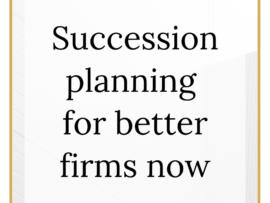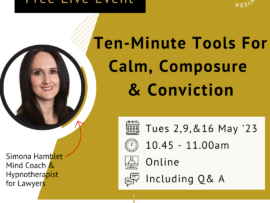Better Weeks For Law Firm Owners & Partners
0 CommentsBetter weeks for law firm owners, sole practitioners & partners
Are you busy but unproductive?
Is your firm as profitable as you want?
Did you set up your firm, in part for flexibility, yet working long hours?
If so, take a look at these helpful tips to help you grow and balance:
1. Intention Days
Intention Days help you focus each day. It also means you use moments to tackle those tasks, or use one of your time blocks, to focus on batched tasks for that area. I used to have ‘Wealth Wednesday’ where I focused on all financial aspects of my life and business. This can include billing, chasing clients, checking whether my suppliers are still good value, and keeping an eye on bank balances. Whilst I had ‘Filing Friday’ to deal with all admin matters, you can just as easily have ‘Finance Friday’. Likewise, ‘Money Mondays’, or if you want to get your blogs and social media posts ready, ‘Media Mondays’. ‘Connection Thursdays’ is also great for keeping in touch with people before another month passes. See what works for you. Change them around until it feels right.
2.Meetings by Minutes
Far too much time is spent in unproductive meetings.
If a meeting is necessary ensure everyone is clear before the meeting what the aim of the meeting is, what decision is needed, and why. Shorter meetings are more productive. If you say a meeting will be only half an hour, make sure it only lasts that long. If you have people at meetings who constantly interrupt (either to show their knowledge about everything, are easily distracted, or to pull everything apart unhelpfully) you may need to have a conversation with them outside of the meetings to explore this. Finally, meetings at 10:30 or 14:00 are more likely to have stragglers than 11:18 meetings.
Lead by example and people will sooner respect the boundaries, will arrive on time, and be better prepared, to make that time count.
Send automated reminders of meetings and appointments, especially for external parties (or customers), to avoid confusion, forgetting and then not turning up.
I also recommend setting Agenda items as clear questions to be answered, we think better when faced with questions, and we get better outcomes.
Outside of meetings, ensure everyone has time without interruption to get on with their work – including from their bosses!
3. Handle Everything Once
That doesn’t mean you have to action everything at once. It does mean getting organised and having somewhere for your filling, or money documents, articles for ideas (that you will actually read rather than hope to) and so forth, so that you can then have them ready for your Intention Days. For more time management tips throughout the day, including an easy way to put processes and standard documents in place, take a look at this article on Time and Productivity. Trello is a great tool for capturing a lot of information.
4. Set Your Goals
Take time to set your goals for that day, week, month, quarter or year. These can include:
- income goals
- how many matters to be transacted/profit per department
- social media (number of posts, increase in audience)
- sales calls to be made, or follow ups
- conversion rates, and from which sources
- increase to database / mailing list (ensure the information is fully captured and recorded)
- events to attend (ensure they are useful and effective)
- any important actions to be taken (accounts, websites, events)
Knowing your goals will help you get clear in your business, and will help you to decide if the activity you are taking at that time, moves you one step closer to them. This will range from selecting the right marketing and networking events, to dealing with management or admin issues. The little things often are the biggest time stealers! Planning time is time well spent (as long as you consistently take focused action too!) Remember, what is measured, is what often gets done.
5. Be Money Smart
Your accountant is a great source of information and support for your business. However, you need to be in control of your money. Understand your accounts, budgets and pricing. Ensure that you:
- review your prices and estimates regularly to ensure you are genuinely generating a profit from them. Do they reflect the marketplace you are aiming for?
- look at the breakdown of where your money is being generated from, which product or service?
- invoice regularly, deal with late payers, and keep an eye on cash flow
- are clear that once you have set your price, you do not negotiate your fees or pricing, but consider different pricing for different types of client
- review your software and utilities, perhaps twice a year, to see if they still meet your needs and are suitably priced
6. Staff Summary
Get support. Whether that is remote typing, a cleaner at home, or employees. Do so as soon as you are able, so that you can focus on the big stuff, and work fewer hours(ie go home on time!).
Recruitment – take time to understand what you want from the role and set the expectations early on. Far too often someone thinks they are doing a great job as they are keeping the clients happy, when in fact the focus of the manager was for the employee to bring in new clients, and now to invoice more often.
Behaviour – if there are behaviour or performance issues, deal with it promptly, openly and positively. Set a clear intention of support, have specific examples, and ensure they lead the conversation on demonstrating an understanding of the expectation, the gap, and how they will close it.
Delegate – effective delegation is a skill that needs to be developed (and is not the same as ‘dumping’ the work on someone else!). Clear instructions, training and follow-ups, especially, at the start is important to ensure everyone knows what is expected. It also saves the panic when all of a suddenly you realise something hasn’t been done a) as you anticipated or b) at all. The latter might be they were too scared to say they were struggling.
Develop – look at leadership opportunities and incentives for others (a bonus will not suit all and can become expected).
Exit – if a staff member wants to leave, allow them to do so as quickly and positively as possible.
7. Customers
Learn to say no and set boundaries. Late-payers or awkward customers? Give them the choice of staying, on your terms, or leaving. The same applies for customers who always contact you at the last minute. Those new terms might be a higher price for last minute requests. It is worth exploring why they act as they do, they may not realise that their behaviour is an issue. One customer of a food supplier thought it was fine to order the night before a delivery was needed!
If you want to know more about a recent wonderful customer service, take a look at my blog on ‘Why I want to be lululemon!
If you want to collect testimonials, ask on an energy high. That may not always be at the end of the transaction, sale or process.
8. Health and Habits
You know the benefits, so do what you can to eat well, move, rest and sleep. Switch off from work. Take breaks. Look after yourself.
Deal with the things that play on your mind. Writing them down as they occur is a great place to start, you can then set a time to come back to it later. If it is still a worry when you come back to it, you can take action on brainstorming, planning, or deciding who can give you support with it.
It may even be people in your life, that you need to reflect on, as to whether to spend less time with them, rely on them less, or end that relationship.
9. Backups and Support
Get everything backed up. With various cloud systems, you should be able to work from anywhere, for much of your work. Ensure you have adequate proactive insurance in place.
Get a good network of support around you. Be it your accountant, therapist, other business owners, coaches, friends or family. Keep an eye out as to whether you are switching off and engaging outside of work. Are you ensuring you maintain personal relationships positively?
Reflect on where there are gaps in your knowledge, where can you source that or learn it?
10. Brand
Your ‘firm’ brand and your ‘you’ brand are extremely important. You need to be clear on your niche and your market. Specialists have greater success and higher profitability. Creating your ideal client avatar(s) is a great way to start this. Take a look at your personal values and aims. Ensure they all align in your firm or role. This will allow you to make decisions far easier around any images you choose, your web design, the places you network, social media platforms, magazines you want presence in, pricing, events to attend and much more. Decision making, business development, recruitment and marketing will be a lot easier.
If you are struggling with any of these areas, do obtain some support. It can be lonely and become all-consuming at the top.
Simona
To find out more about coaching or to book her for your organisation, please email team@simonahamblet.com or contact her here.

























































































































